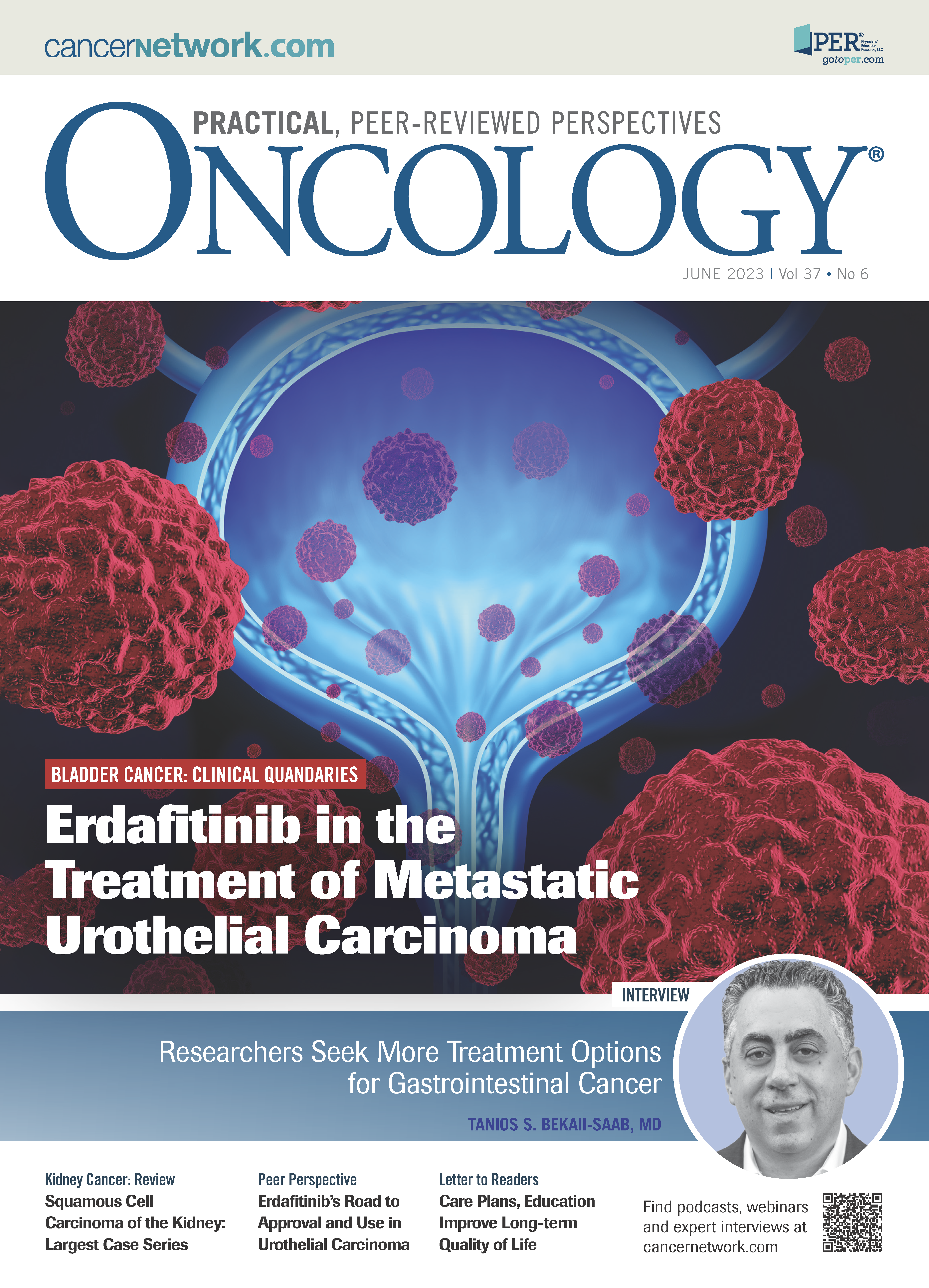Erdafitinib’s Road to Approval and Use in Urothelial Carcinoma
Kirollos S. Hanna, PharmD, BCPS, BCOP, FACCC, offers a perspective on a clinical quandary published recently in the journal ONCOLOGY.
Urothelial carcinoma (UC), also known as transitional cell carcinoma, is the most common genitourinary malignancy and the sixth most common cancer in the United States.1,2 Despite falling incidence rates over the past 10 years, death rates have remained stable. Survival varies significantly by stage of disease; patients with UC present with nonmuscle-invasive bladder cancer (NMIBC), MIBC, or metastatic UC (mUC), and 5-year survival rates range from 70% or greater, to 30% to 40%, to 5%, respectively. Despite the disease being one of the top mutated cancers, the roles of immunotherapies and targeted therapies have been limited until recent years.
Treatment selection for locally advanced or mUC is heavily influenced by performance status and the presence of comorbidities that may render patient’s ineligible to receive platinum-based chemotherapy. The National Comprehensive Cancer Network (NCCN), recommends that patients who are able to tolerate platinum-based chemotherapy receive treatment in the frontline setting for advanced disease because of improved survival and response rates.3 Immunotherapy has also made a drastic impact as a treatment option for patients who are platinum ineligible, following progression on platinum-based chemotherapy, or as maintenance following platinum-based chemotherapy.
FGFRs are widely distributed transmembrane tyrosine kinase receptors. Aberrations in the genes encoding FGFRs are common in a wide variety of cancers, with the majority being gene amplifications or activating mutations. They are involved in cell development, differentiation, survival, and migration, as well as angiogenesis and carcinogenesis. In humans, 4 FGFRs (FGFR1-FGFR4) share structural homology with vascular EGFRs, platelet-derived growth factor receptors, and other tyrosine kinase receptors, which has implications for pharmacologic therapy. FGFRs signal through several intracellular pathways, including the RAS/RAF/MEK and the PI3K-AKT pathways. Specific FGFR mutations have been observed in a proportion of bladder cancers, and FGFR aberrations occur in approximately 10% to 20% of mUC cases.
The FDA initially granted erdafitinib (Balversa) breakthrough designation status as a novel agent for the treatment of UC in March 2018.4 The confirmed approval of erdafitinib occurred on April 12, 2019, making it the first FGFR inhibitor on the market, the first oral option in UC treatment, and the first targeted treatment option for UC.5 Erdafitinib is indicated for adult patients with locally advanced or mUC who have an FGFR3 or FGFR2 genetic alteration and who have progressed during or following at least 1 line of prior platinum-containing chemotherapy, including within 12 months of neoadjuvant or adjuvant platinum-containing chemotherapy. Erdafitinib is dosed at 8 mg orally once daily with or without food, increasing to 9 mg daily if select parameters are met.
Updated data from the phase 2 BCL2001 trial (NCT02365597) in patients receiving 8 mg daily demonstrated similar efficacy to earlier trials.6 The major efficacy outcome measures were objective response rate (ORR) and duration of response (DOR), as determined by blinded independent review committee. The median age of participants was 67 years (range, 36-87 years); 79% of patients were men and 74% were White. Most patients (92%) had a baseline ECOG Performance Status Scale score of 0 or 1. Eighty-four (97%) patients had received cisplatin or carboplatin previously; 56% had received only cisplatin-based regimens, 29% carboplatin-based regimens, 10% both regimens, and 5% were not defined. Three (3%) patients had disease progression following prior platinum-containing neoadjuvant or adjuvant therapy only. Twenty-four percent of patients had been treated with prior immune checkpoint inhibitors. The ORR was 32.2% (95% CI, 22.4%-42.0%), with complete responses in 2.3% of patients and PRs in 29.9%. The median DOR was 5.4 months (95% CI, 4.2-6.9).
In the BCL2001 trial, (NCT02365597) there were 2 treatment regimens: 10 mg once daily, 7 days on and 7 days off, and 6 mg once daily for 28 days. The analysis showed that both dosing schedules had promising efficacy and tolerability, and the investigators decided to optimize the dosing in the trial at 8 mg daily (continuous), with a dose increase to 9 mg once daily in patients whose serum phosphate levels were below the target of 5.5 mg/dL between days 14 and 17. Among the 87 patients treated in BCL2001, the most common adverse effects (AEs), in 20% or more of patients, included abdominal pain, alopecia, decreased appetite, and constipation. Grade 3 or higher AEs occurring in 1% or more of patients were hyperphosphatemia, keratitis, nail disorder, nail dystrophy, onycholysis, palmar-plantar erythrodysesthesia syndrome, paronychia, and stomatitis.
Of note, a dose increase occurred in only 41% of patients. Ocular toxicities may occur with erdafitinib and may be severe. Central serous retinopathy/retinal pigment epithelial detachment was reported in 25% of patients in the trial, with a median time to first onset of 50 days. Thirteen percent of patients had resolution and in 13% the condition was ongoing at data cutoff. Dry eye symptoms occurred in 28% of patients. Ophthalmological exams should be conducted during the first 4 months of therapy and every 3 months after.
Erdafitinib offers a first-in-class oral option for patients with advanced bladder cancer with select FGFR mutations. Clinicians should be well versed in the management of patients to ensure optimal and safe outcomes.
References
- American Cancer Society. What is Bladder Cancer? Accessed May 8, 2023. https://bit. ly/3M3PXHt
- Saginala K, Barsouk A, Aluru JS, Rawla P, Padala SA, Barsouk A. Epidemiology of bladder cancer. Med Sci (Basel). 2020;8(1):15. doi:10.3390/medsci8010015
- NCCN. Clinical Practice Guidelines in Oncology. Bladder cancer, version 2. 2023. Accessed May 8, 2023. https://bit.ly/3HP62zh
- Janssen announces U.S. FDA breakthrough therapy designation for erdafitinib in the treatment of metastatic urothelial cancer. News release. Janssen. March 15, 2018. Accessed May 8, 2023. https://bit.ly/2IuIsre
- FDA grants accelerated approval to erdafitinib for metastatic urothelial carcinoma. News release. FDA. April 12, 2019. Accessed May 8, 2023. https://bit.ly/301B7bB
- Loriot Y, Necchi A, Park SH, et al. Erdafitinib in locally advanced or metastatic urothelial carcinoma. N Engl J Med. 2019;381(4):338-348. doi:10.1056/NEJMoa1817323
